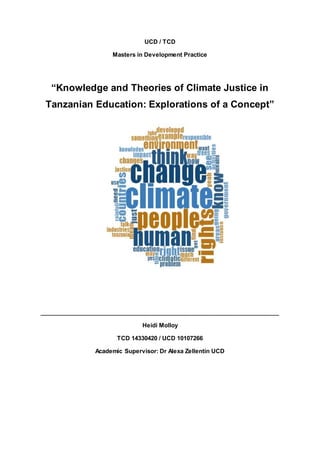
Climate Justice in Tanzanian Education
- 1. UCD / TCD Masters in Development Practice “Knowledge and Theories of Climate Justice in Tanzanian Education: Explorations of a Concept” _________________________________________________________________________ Heidi Molloy TCD 14330420 / UCD 10107266 Academic Supervisor: Dr Alexa Zellentin UCD
- 2. I Summary: Background: Human rights education has been shown to build knowledge and skills, as well as attitudes and behaviours, that promote and uphold human rights. Climate change education has also been shown to improve practices and lead to better environmental outcomes. Purpose: This study aims to assess whether taking a human rights based approach to climate change education has the power to generate not only increased awareness but also promote action in the area of climate justice. Sample: This study was conducted in a Teacher Training College in Tanzania. The College in question is engaged in a five-year research project aimed at assessing knowledge and gaps within Climate Change Education in Tanzania. This research was conducted independently, alongside the ongoing project. The sample consisted of six student focus groups across the three departments of Geography, Political Science and Linguistics, as well as six lecturer interviews across the departments of Geography, Development Studies, Political Studies and Linguistics, and one elite interview with a high ranking member of staff from the Centre for Climate Change Studies in the University of Dar es Salaam. Results: Through the course of the research it became apparent that although there were clear linkages made between climate change and its effects on human rights, knowledge of the concept of climate justice was almost non-existent. Education was cited to be the best and most appropriate location for the introduction of the concept of climate justice, however there were concerns that this should be done only if it were an approach that fit into the Tanzanian context. Poverty was regularly mentioned as an issue that took precedence over concerns of climate change. Religion was also regularly mentioned in the context of climate and there were some other competing discursive fields and alternate locations of blame. Conclusions: The findings reported here suggest that taking a human rights based approach to climate change education would not only generate increased awareness but may also lead to an advancement of the concept of Climate Justice, whether or not we would see increased action in regards to the fight for climate justice is not so clear. The data gathered clearly illustrated that people are and have been making linkages between human rights and climate change but they seem to lack the platform upon which to discuss them. Throughout the course of the project the necessity that any concept takes into account the broad diversities in not only the impacts of climate change and how they are felt locally but also local understandings of climate change, human rights and education came to the forefront of the discussion.